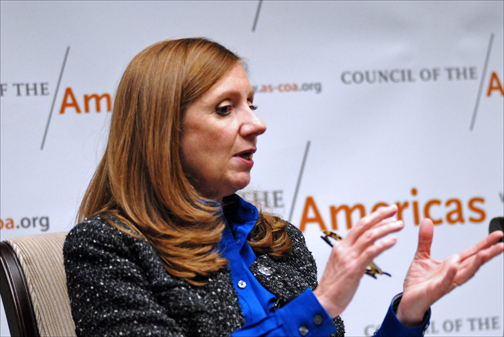Panel: TPP can both help, hurt LatAm, Caribbean nations


World Bank official Anabel González, Costa Rica’s former minister of foreign trade, discusses the Trans-Pacific Partnership and its implications for Latin America. (Credit: Larry Luxner)
WASHINGTON — The highly controversial Trans-Pacific Partnership could be an economic bonanza for Latin America and the Caribbean, even for countries that aren’t signatories to the 12-nation trade accord, say experts speaking at a recent panel.
“Virtually every article written about TPP refers to an agreement with Asia,” said Eric Farnsworth, vice-president of the Americas Society/Council of the Americas, which arranged the panel to examine the TPP’s long-term implications for Latin America.
“Frequently, China is the focus, even though China isn’t a party to the agreement. But TPP is not just about Asia. It reaches the shores of North and South America … and may have downside implications for Central America and the Caribbean.”
Anabel González, Costa Rica’s former foreign trade minister, lobbied hard for her country’s inclusion in the Central American Free Trade Agreement (CAFTA) in 2007. Today, she’s senior director of the World Bank Group’s global practice on trade and competitiveness.
González, citing a World Bank study published earlier this year, praised CAFTA, which beginning in August 2004 gradually eliminated tariffs and quotas between the United States, the Dominican Republic and five Central American countries: Costa Rica, El Salvador, Guatemala, Honduras and Nicaragua.
The accord took effect Jan. 1, 2009, and today, Costa Rica now accounts for around 40 percent of CAFTA exports to the United States — from computer processors to coffee — far outpacing its Central American neighbors.
“The results have been quite impressive in terms of mobile penetration and the reduction in prices for telecom services — not only for consumers but also for foreign investors who require these types of services. Overall, the story has been a very positive one,” said González, adding that foreign direct investment in manufacturing, specifically medical devices, has been substantial over the past five years.
According to the World Bank report, one of the treaty’s most important benefits since 2009 has been “to reinforce government commitment to liberal trade and FDI-friendly policies and to strengthen the legal framework on the rights of foreign investors.”
Added Christopher Padilla, vice-president of governmental programs at IBM and a former U.S. undersecretary of commerce for international trade: “Look at Costa Rica’s success. CAFTA has drawn in foreign investment. IBM has invested heavily in Costa Rica thanks to its telecom reform laws.”
CAFTA is ‘puny’
In economic terms, however, CAFTA is puny compared to the TPP, whose 12 member nations — which include the United States, Australia, Canada, Mexico, Japan, Peru and Vietnam — together comprise 40 percent of the world’s economy.
“The TPP is a very strong agreement from a commercial standpoint, with many groundbreaking provisions in it,” said Padilla. “Of particular interest to IBM, this is the first trade agreement to have extremely strong provisions to safeguard digital trade in the 21st century.”
Padilla, whose firm was one of the first corporate supporters of TPP, predicted that “before the end of this year, the vast majority of the U.S. business community will come out strongly in support of this agreement and push strongly for its passage.”
The same day as the AS/COA panel, however, Senate Majority Leader Mitch McConnell (R-KY) crushed any hope that Congress would approve TPP before the 2016 presidential elections.
Speaking to the Washington Post, McConnell said President Obama would risk defeat of the trade deal if he lobbied for passage next year, warning that “it certainly shouldn’t come before the election. There’s significant pushback all over the place.”
Leading GOP presidential contender Donald Trump has already called it a “disaster,” while Hillary Clinton, who leads the polls among the Democrats, is also against the deal.
Yet Arturo Sarukhan, Mexico’s former ambassador to the United States, said his country’s experience with the North American Free Trade Agreement suggests that TPP may actually turn out to be a win-win for the region.
“If you look at Mexico when we negotiated NAFTA and look at Mexico today, it’s a radically different country,” said Sarukhan, now a private consultant in Washington. “The reason why it changed is that Mexico knew that for it to get the votes it needed on Capitol Hill, it would have to enact a host of economic reforms. It prodded Mexico to become a less inward-looking country than it had been in decades.”
But for countries that are not part of TPP, it could be a different story.
“In the case of textiles and apparel, there is concern in Central America — especially in the Northern Triangle and Nicaragua — about the impact this may have vis-à-vis Vietnam,” said IBM’s Padilla, noting that foreign investment could be diverted to Asia as a result of the TPP.
Serious issues could also arise if, in the future, the TPP’s current roster will be expanded only to countries belonging to the 21-member Asia Pacific Economic Cooperation (APEC) group.
“If so, that’s not very good news for Latin America,” he warned. “Colombia is a case in point. I would argue that other countries like Costa Rica and Panama should also be members of TPP.”










